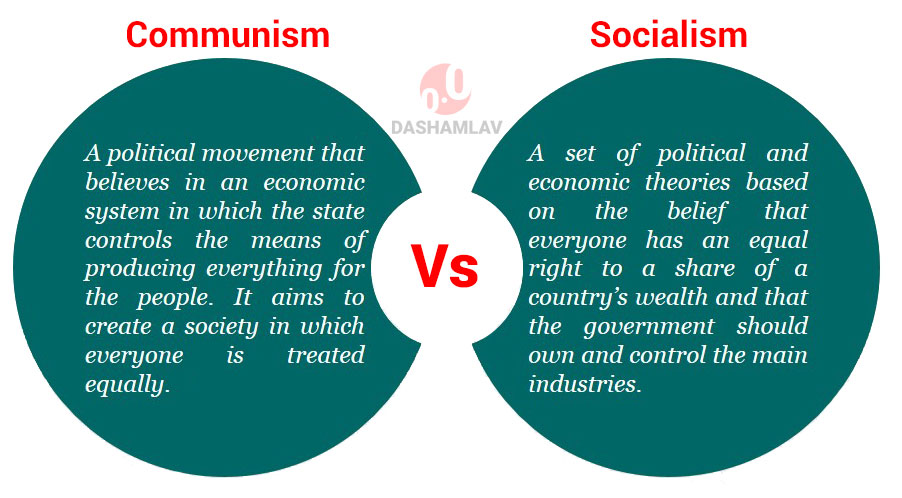Communism and socialism are both ideologies which revolve around the concept of social equality and egalitarianism. The fundamental inclination of both these ideologies is pretty much similar. So much so that the hero of Russian Revolution, Vladimir Lenin once said that “the goal of socialism is communism”.
Major Differences between Communism and Socialism
1. Definition
What could be the better way to begin with distinction than with the definition itself? The Oxford English Dictionary defines communism as a political movement that believes in an economic system in which the state controls the means of producing everything for the people. It aims to create a society in which everyone is treated equally.
Socialism is defined as a set of political and economic theories based on the belief that everyone has an equal right to a share of a country’s wealth and that the government should own and control the main industries.

You might find it interesting that the Oxford English Dictionary defines socialism as a set of political and economic theories. On the other hand, it defines communism as a political movement in an economic system. This is because socialism encompasses a range of social and economic systems. Communism, on the other hand, has been widely considered as movement whose ultimate goal is to establish a communist society.
In communism, the means of production are controlled by the state on behalf of the people and the production is equally distributed. In socialism, however, people collectively own the means of production and the equality is adhered to in collective ownership. Socialism adheres to equality in equal distribution of means of production & resources whereas communism adheres to equality in equal distribution of the produce. Let’s understand this with an example!
Socialist state: Each individual keeps one sheep each and enjoys the wool and milk the sheep produces.
Communist state: State keeps all the sheep on everybody’s behalf and equally distributes the wool and milk.
2. Property
The concept of private property has no relevance under communism. Every piece of property is collectively owned by all the people but controlled by the state. Every individual will be allotted the property as deemed necessary by the State after quantifying his/her needs but there would be no private ownership.
Under socialism, the main means of wealth generation and employment creation are owned by the people and managed by the State. However, people are also allowed to own private properties like a car.
3. System of Government
Theoretically, there should be no leader in a communist state and the people should govern themselves directly. However, practicality is different and communism tends to center around one-party state. Communism has no place for any political dissent.
Socialism is a diffuse pack of competing ideologies which makes it difficult to associate it with any one form of government. A socialist state is a workers’ state. A sovereign state with any form of government machinery that is constitutionally dedicated towards establishment of socialism would be categorized as a socialist state.
4. Views on Capitalism
Capitalism is profit driven and it widens the class gap both economically and socially. In this regard, socialism often come in conflict with the capitalist society. However, it does not require complete elimination of capitalist class. In fact, in many countries socialism and capitalism have co-existed.
Communism, on the other hand, discard the existence of capitalism in totality as it aims to establish a classless society. It is of the view that capitalism and communism cannot co-exist.
5. Religion & Marriage
Communism completely abandons the concept of religion and marriage. Socialism offers every individual with the freedom to choose their religion but it emphasizes more on secularism. Same goes with marriages in socialism.
6. Existence of Class
In the definition itself communism advocates for classless society. As there exist no avenue for earning more than the others, it eliminates competition as well. Thus the class distinction becomes non-existent.
Socialism let some classes exist but it diminishes the difference between the classes. These classes are more political in nature than social. Besides, it is also likely for some people to earn more than others.
7. Agent of Change
In a communist state, the government is considered to be the agent of change. Socialism promotes workers as the nominal agent of change. Change is not market driven under both these ideologies.
8. Political Movement
Communism has an international character as a political movement. Contemporary proponents of communism all the across the globe maintain ideological solidarity with each other.
Socialism, on the other hand, is a political movement of workers and middle-class which aims toward common democratic goal.
9. End Goal
The end goal of socialism is communism. The end goal of communism is establishment of classless, stateless and moneyless society.
10. Examples
Presently, a few countries which formally claim to be adhering to the ideology of communism are China, Cuba, North Korea, Vietnam and Laos.
Countries like Canada, Netherlands, Finland and Denmark claim to adhere to the principles of socialism. Even India as nation proclaims itself to be a socialist state under the preamble to its constitution.
Conclusion
We hope that the major differences between communism and socialism explained here are helpful for you. From philosophical basis to economical angle and from social aspects to ownership, we have tried covering all the major differences in a much broader form.
Also, now that you’ve read the article from top to bottom, attempt answering the question below. Let’s test your general awareness…
According to you, which socialist countries could be categorized as pro-market? Leave your answers in the comments section given below.
Use the citation below to add this article to your bibliography
"Communism and Socialism: Major Differences in Ideologies." Dashamlav.com. Web. 22 May 2025. <https://dashamlav.com/communism-socialism-differences/>
Dashamlav.com, "Communism and Socialism: Major Differences in Ideologies." Accessed 22 May 2025. https://dashamlav.com/communism-socialism-differences/
"Communism and Socialism: Major Differences in Ideologies." (n.d.). Dashamlav.com. Retrieved 22 May 2025 from https://dashamlav.com/communism-socialism-differences/
